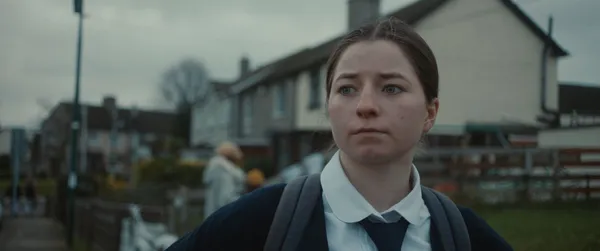 |
| Hazel Doupe in You Are Not My Mother Photo: Signature Entertainment |
This year’s Frightfest strand at the Glasgow Film Festival has been dominated by the impressive contributions of Irish filmmakers, and one of the highlights is this powerful first feature from Kate Dolan. Drawing heavily on folklore and set in a community where it’s far from being a thing of the past, You Are Not My Mother stars Hazel Doupe as an outcast teenager trying to find her place in the world whilst coping with her mother’s (Carolyn Bracken) mental illness, and gradually being persuaded by her grandmother (Ingrid Craigie) that it might not be what it appears. When Kate and I connected, she was keen to talk about the origins of the story and its deep roots in Irish culture.
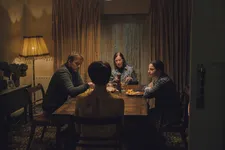 |
| Family time Photo: Signature Entertainment |
“As an Irish person, I think folklores are a big part of your life growing up,” she says. “The stories are told to you all the time. And you know, it's kind of in school and outside the school and everywhere, I think it permeates into your life. Growing up, I never saw that kind of folklore as I knew it represented in film and TV, the way that I would have liked. Our folk stories are quite dark, they're very tragic, can be quite sinister and, I think, feel like they really lend themselves to the horror genre. So I always wanted to make a story that was inspired by Irish folklore and paganism, and witchcraft in Ireland. And then I also wanted to make a film about trauma within a family and as somebody is coming of age, how that affects them, and how they had to confront that and how it informed who they are as they come of age. I felt like the two kinds of ideas really melded together well, as a way to tell that story, and I just went from there.”
We talk about how in Scotland, where I am, and even more so in Ireland, lots of older traditions continue to thrive alongside Christian and scientific ways of understanding the world.
“I've grown up in Dublin, which is, you know, very urban, all my life,” she says, “and I think it didn't make the folk elements or pagan elements of our history any less. On Halloween night in Dublin, most estates would light a bonfire. And that's the pagan tradition of lighting a bonfire on the pagan Gaelic holiday of Samhain, to keep away evil spirits. Even on Beltane, which is the first of May, people do traditions, and on Wren Day there's pagan traditions as well, activate in the west of Ireland too, so I think it is very much still a part of us. I wanted to have my experience of that, but it's very grounded and authentic, it's just like, my granny would be telling me she's going to go to a widow's curse on someone, but then we'd be watching telly in our sitting room, you know? It takes the kind of magical element out of it almost, it feels more just like a part of everyday life. I love like magic in the everyday, and that it feels like it's part of our real world. That was something that I wanted to explore.”
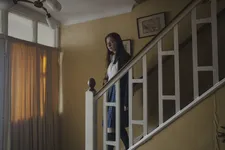 |
| Learned wariness Photo: Signature Entertainment |
I tell her that I felt that brought up some really creepy moments in the film as well. There was a bit that I really loved where the teenagers are talking about how the river is underneath a lot of the city, and it’s like a little hint of the wilder environment bleeding over into the city.
“I love the idea of kind of sacred spaces,” says Kate. “I read a book while I was researching the script, and it was about witchcraft, but there was a chapter about sacred space and how places have a memory. And I think Dublin is really interesting because it's not a huge city, but it's got quite a sprawl on there so like there's an estate housing estate on the outskirts of Dublin that has an actual portal dolmen, the megalithic stone structure, just kept in the middle of a green that all the houses are built around. As the city spread sacred places had to be built over, but they're probably still part of it. So that was something that I find really interesting.”
I note that I also liked the way the film looks at the city the way that teenagers do, finding those alleyways and those bits of waste grounded saw the adults don't really notice, but that are part of their social landscape.
She laughs. “Growing up, that was so my life, like just wandering the streets, and then you find an empty loft or a laneway. And then you'd spend hours there, wandering around. I think a lot of the places we had in the film were actually places that I had done that in, because we were having trouble finding locations during when Covid was a terrible thing. It was harder to get locations, and find things in directories and all that kind of stuff. So a lot of the time I was like, ‘I remember a good laneway,’ like bringing the crew there, and we would look at it. So it's kind of funny, because a lot of the locations and film are like revisiting places I grew up in or spent time in as a teenager. It’s quite nostalgic.”
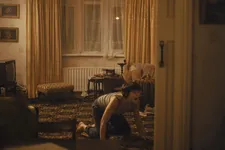 |
| Behind closed doors Photo: Signature Entertainment |
I really loved the way that she directed the interactions between teenagers, I tell her. I think a lot of adults forget what it's like to be that age and don't manage to capture it in a natural way.
“I think we were really lucky in the cast,” she says. “The girls were had a great chemistry naturally, and they got along really well. I made sure that they knew they could bring themselves into it a little bit so that they didn't need to rigidly to go with the scripts. I said ‘Be yourself in a way, bring your own flavour to it.’ So that was really nice. But yeah, I went to an all girls Catholic school when I was a teenager, so I think the interactions of teenage girls has always fascinated me, just how it can just be so, you know, they can be your enemy, then they can be your best friend in a very short amount of time.”
How did she go about casting those roles?
“The first person we cast was Hazel, and then we picked the rest of the cast after we had Hazel on board. We knew she was the linchpin of the movie. So then the family kind of came from that. And then the girls as well – before Covid hit, we did a big audition with a lot of teenage girls to find Suzanne, who Jordanne Jones plays, and we actually found Katie and Florence who play the other girls in the film. I just felt like I loved them and I thought they were brilliant. Jordanne was right for Suzanne but I really wanted to have them on board. And even though the roles were kind of smaller, they were so brilliant, they very graciously accepted the offer to take the smaller roles just because I really wanted to work with them. I just felt like they had great talents, and brilliant personalities as well.”
It’s also nice to see a different family structure on screen when so many films choose the mum, dad and 2.5 children option.
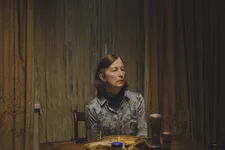 |
| A keeper of tradition Photo: Signature Entertainment |
“Yeah, well, definitely. I was raised by a single mother and my grandmother for a while when I was growing up, and then because my mother worked a lot, my uncles and aunties would often take care of me and my cousins. This is a different family then maybe we’re used seeing onscreen, but that was just my personal experience growing up and in the places where I grew up, that wasn't a weird thing. A lot of people were in similar situations, so it just felt reflective of my authentic experience and other people that I knew as well.”
Obviously there's the extra complication with this family that the mother is mentally ill from the start. It's an area where cinema hasn't always done a good job. How did she research it and make sure that she got it right?
“It was really important to me,” she says. “I'd never wanted it to feel like I was saying that a person who has a mental illness is a monster. Again, I think that was very difficult line to tread. And because, as you say, in horror, especially, mental illness has been often depicted in a very problematic way. To me, I feel like the main key point was that this film was through the eyes of the person coming of age. So it's really about someone who is seeing their parent, and struggling and not knowing how to deal with that, or confront that, and is sort of in denial for most of the film as well about whether that's happening or not, and not addressing it. And I think that, to me, was the most important thing: it was really about the person coming of age’s experience, their personal experience of that.
“I think you know, as well, more about that mental illness in your family as you come of age, how you deal with that, and that it's always kind of a part of you, and how you make sure that it doesn't overwhelm your life, and that you can be a survivor, and you can get through it. You need to constantly be aware of it, but it's not the end of everything. I mean that it's something that you can deal with openly and you can kind of talk to people about it, communicate about it.
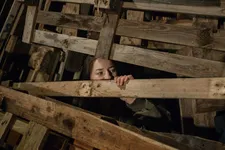 |
| Things hidden in plain sight Photo: Signature Entertainment |
“As somebody coming of age in a family like that, I think you have to grow up very fast, and sometimes deal with that when you're not really equipped to. It's like kind of managing, I suppose, how much you take on. Obviously, sometimes you have to do things to take care of your family when you're not ready, but I think you also can say no to that.”
She’s really excited about being at Frightfest, she says.
“Catcalls, my short film, played at Frightfest in London about 2019. I think it's just so nice when film festivals that have supported you when you're kind of coming up and making short films, they kind of track you and follow you and want to support you again. And genre film festivals are my favourite. Not just because I love horror movies. I think they're such a warm and welcoming audience, and they're just really excited to watch horror and it's always great fun to kind of have conversations at those festivals because everyone's just a horror fan wanting to talk about it and talk about movies, and real cinema lovers as well.”
You Are Not My Mother screens at the Glasgow Film Festival on 11 March. It’s in Irish cinemas now and will open in UK cinemas an on Digital on 8 April.





















